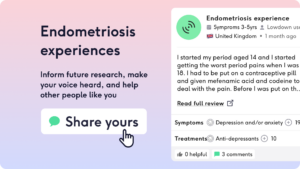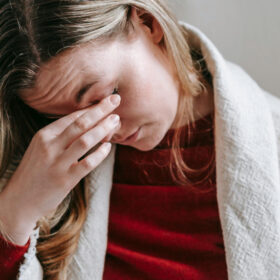
Racial disparities faced by Black women seeking endometriosis diagnosis
What's the lowdown?
Black women have significant challenges when seeking a diagnosis for endometriosis.
Despite growing awareness of endometriosis in black women, there are still systemic inequalities that can affect the timing of diagnosis.
This post is to shed light on the unique experiences of black women with endometriosis and to help advocate and give advice for navigating the healthcare system.
What’s the deal with endometriosis anyway?
Endometriosis is a condition that can affect the whole body. It’s a chronic inflammatory condition and affects about one in ten people who were assigned female at birth [2]. The symptoms range from severe period pain or painful sex, to a change in bowel habit, brain fog and fatigue. We’ve put together a handy article to give you the lowdown on endometriosis.
What’s race got to do with it?
Endometriosis doesn’t discriminate. It can affect those of all backgrounds.
Unfortunately, there is limited research exploring how race and ethnicity can impact the prevalence of endometriosis. Studies often overlook the intersectionality of race and gender, failing to address the unique challenges faced by black people in accessing healthcare services.
Specifically, research currently suggests that black women may be less likely to receive an endometriosis diagnosis compared to white women. There’s limited research exploring how race and ethnicity can impact the symptoms experienced by people with endometriosis, as well as their access to treatment, their treatment preferences, and their responses to treatment [1].
There is a concerning disparity in healthcare access and outcomes for black women with endometriosis. On average, people with the condition wait between 8 to 12 years to be diagnosed, but for black women, this wait time is even longer [2]. Research has shown that black women were 50% less likely to receive a diagnosis than their white counterparts [3].
Why? Well, there are a few factors at play…
These delays are influenced by various factors, including difficulties in accessing gynae care and also systematic racism within the medical system. This means that black women may endure prolonged pain without receiving the proper diagnosis and treatment they need.
While awareness of endometriosis in black women has increased, research specifically focusing on black women’s experiences remains limited.
What are the systemic inequalities and barriers that black women face when seeking a diagnosis for a medical condition?
Healthcare bias
Everyone deserves equal access to accurate diagnosis and compassionate treatment. Unfortunately, systemic inequalities and barriers can often stand in the way, especially for black women who are facing medical conditions like endometriosis.
Implicit biases among healthcare providers can lead to disparities in the diagnosis of endometriosis. Black women can often face scepticism and dismissal of their symptoms, delaying proper care. For example, J Marion Sims, a 19th-century American doctor known for inventing the speculum conducted experimental surgeries on enslaved women without their consent and without pain relief [4].
Sims justified his decision by wrongly believing that black people had higher pain tolerance [5]. Unfortunately, this racist misconception still affects healthcare today. A survey in the UK found that many black people have encountered prejudice from healthcare professionals, including situations where their pain was dismissed, underplayed or ignored [6].
Cultural stigma & silence
It’s key to recognise the impact of cultural beliefs and stigmas on reproductive health, particularly for black women dealing with endometriosis symptoms. These taboos may lead to hesitation in seeking medical assistance, delaying diagnosis and treatment. Additionally, misconceptions and a lack of awareness only solidify the issue, making it harder for black women to get the help they need.
What can I do?
If you have any symptoms of endometriosis, (covered in our blog post on what endometriosis feels like), take a look at some of our tips below. It’s not all doom and gloom!
Self-advocacy
Trust your instincts and advocate for yourself during medical appointments. Clearly communicate your symptoms and concerns to healthcare providers using our blog on how to speak to your doctor. Remember you’re your own best advocate and your input is so important in making sure you receive the care you deserve. If you struggle with this at medical appointments, you can always bring someone along with you.
Seek support
Connect with online communities and support groups for black women with endometriosis. Sharing experiences and resources can provide valuable support and guidance. You can share your experiences of endometriosis on The Lowdown. We offer a safe space for sharing experiences, finding solidarity with people in a similar situation to you and accessing information and resources that may help you.
Educate yourself
Stay informed about endometriosis and its symptoms. Knowledge empowers you to ask the right questions and make informed decisions about your health. Take advantage of the blog posts on The Lowdown which can help you to deepen your understanding of endometriosis and how it can affect you. By staying informed, you can actively participate in your healthcare journey and work with your team to find solutions to help you manage your symptoms and improve your quality of life.
Your health and well-being deserve attention and care, and taking proactive steps can make a positive difference in your journey toward diagnosis and treatment. Endometriosis doesn’t discriminate, but unfortunately the healthcare system can.
There is good news. Campaigns like the 5xMore campaign are driving significant changes in healthcare, and there are other initiatives like the Reproductive Justice Initiative who aim to create a more inclusive and supportive healthcare environment for all.
To black women who are navigating their journey with endometriosis, know that you’re not alone. Your voice matters, and your health deserves to be prioritised. At The Lowdown, we strive for a system that truly serves and supports every individual, regardless of the colour of their skin.

Our medical review process
This article has been medically reviewed for factual and up to date information by a Lowdown doctor.






